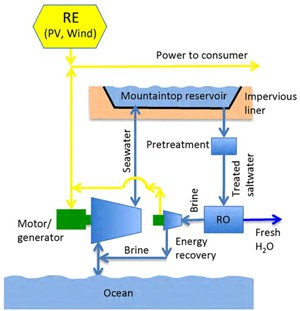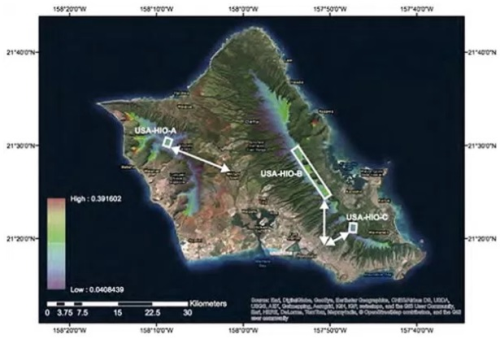

Many coastal regions across the world have severe drought conditions. In an effort to deliver fresh water to these regions, while also considering how to produce the water efficiently using clean-energy resources, the research team from MIT and the University of Hawaii at Manoa (UH Manoa) created a detailed analysis of a symbiotic system that combines a pumped hydropower energy storage system and a reverse osmosis (RO) desalination plant.
Their work is outlined in the article Integrated Pumped Hydro Reverse Osmosis Systems in Elsevier journal Sustainable Energy Technologies and Assessments.
The integrated pumped hydro reverse osmosis (IPHRO) approach employs a lined reservoir located in high mountains near a coastal region to store sea water, which is pumped up using excess power from renewable energy sources or nuclear power stations. When energy is needed by the electric grid, water flows downhill to generate hydroelectric power. With a reservoir elevation greater than 500 m, the pressure is great enough to also supply a RO plant, eliminating the need for separate pumps.
An additional benefit is that the amount of water typically used to generate power is about 20 times the amount needed for creating fresh water. That means the brine outflow from the RO plant can be greatly diluted by the water flowing through the hydroelectric turbines before it discharges back into the ocean, which reduces reverse osmosis outflow system costs.
IPHRO location
The team developed an algorithm that calculates a location's distance from the ocean and mountain height to explore areas around the world where IPHRO systems could be installed.
They identified possible IPHRO system locations with potential for providing power and water – based on the US average of generating 50 kilowatt-hours of energy and 500 liters of fresh water per day – to serve 1 million people. In this scenario, a reservoir at 500 m high would only need to be 1 km2 in size and 30 m deep.
The report includes specific case studies for Southern California, Baja, Hawai, Chile, Peru and the Middle East.
“As we in Hawaii strive to meet our aggressive clean energy goals, we need to invest in large-scale energy storage projects to smooth and condition the inherent intermittency of renewable energy sources,” says UH Manoa mechanical engineering Assistant Professor A. Zachary Trimble, one of the authors of the article.
“Pumped hydro storage is a proven technology that doesn’t come with the challenge of battery disposal each decade. Additionally, particularly here in O'ahu, fresh water is a precious, and in some of the islands a dwindling, resource. IPHROs utilize a symbiotic relationship between pumped hydro energy storage and reverse osmosis desalination to simultaneously provide two services Hawaii needs: utility scale energy storage and fresh water.”
The team's analysis determined that in Southern California, all power and water needs can actually be met for 28 million people. An IPHRO system could be located in the mountains along the California coast or in Tijuana, Mexico, and would additionally provide tens of thousands of long-term construction and renewable energy jobs. Findings show that to build this system the cost would be $5000-10,000 per person served.
Middle East opportunities
Working with colleagues in Israel and Jordan under the auspices of the MIT International Science and Technology Initiatives (MISTI) program, the team has also studied possible sites in the Middle East, as abundant fresh water and continuous renewable energy could help bring stability to the region.
"Considering the cost per refugee in Europe is about €25,000 per year and it takes several years for a refugee to be assimilated, an IPHRO system that is built in the Middle East to anchor a new community and trading partner for the European Union might be a very good option for the world to consider," says the paper’s co-author Alexander Slocum, the Pappalardo Professor of Mechanical Engineering at MIT.
"If we create a sustainable system that provides clean power, water, and jobs for people, then people will create new opportunities for themselves where they actually want to live, and the world can become a much nicer place."


